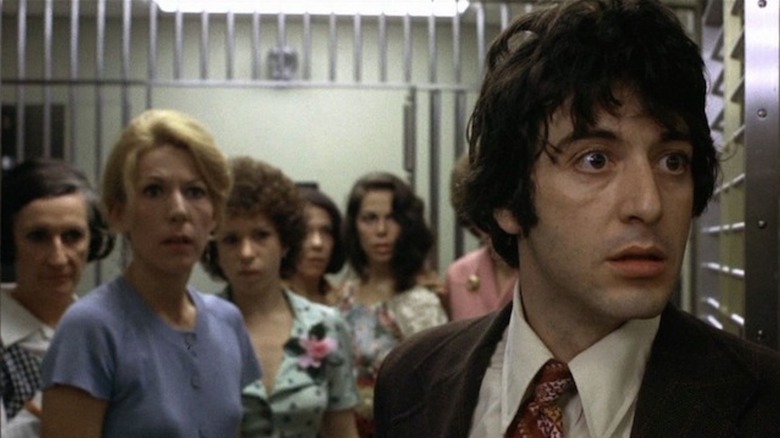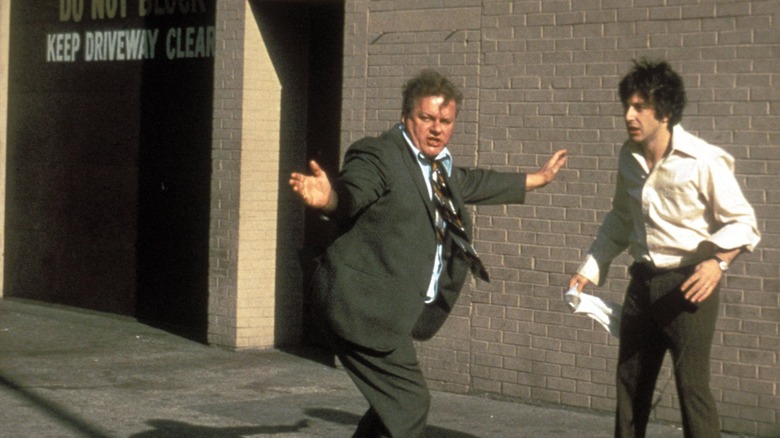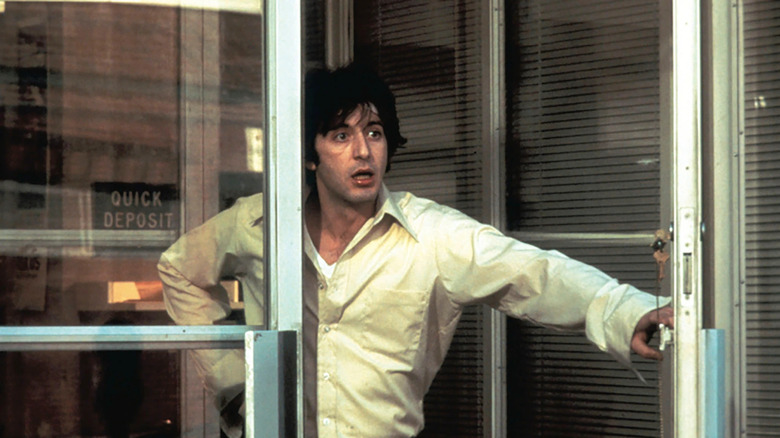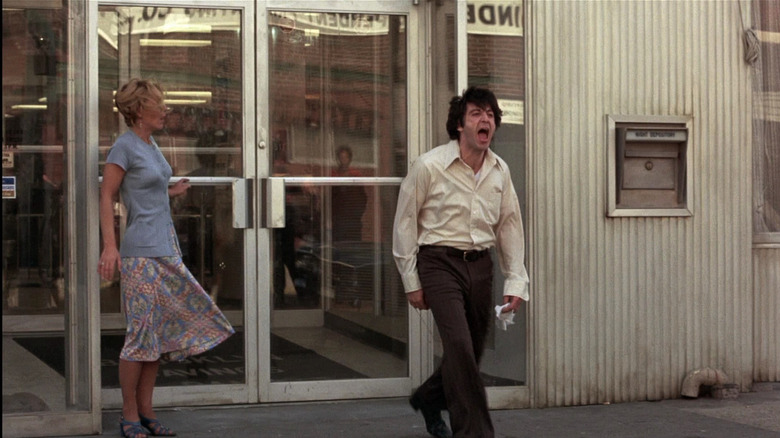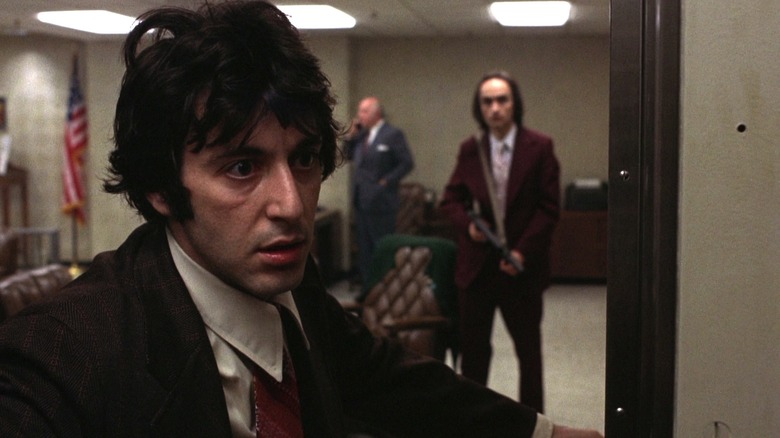The True Story That Inspired Dog Day Afternoon
Village Voice columnist Arthur Bell covered plenty of LBGTQ+ issues during his time with the paper, and sensational stories had a way of finding him. On August 2 1972, he received a tip-off that two homosexuals were holding up a bank. Sniffing out the story, Bell phoned the branch and ended up in a farcical exchange that went like this (via Village Voice):
"Hello, this is Arthur Bell from The Village Voice. Can you tell me what's happening?" The voice at the other end said, "Arthur, am I glad it's you. This is Littlejohn." "Littlejohn, what the hell are you doing down there?" "I'm one of the robbers." "Jesus Christ!"
It turned out that Bell knew the ringleader of the heist, John Wojtowicz, by another name through the Gay Activists Alliance — Littlejohn Basso.
Bell had a knack of inserting himself into a story; he also wrote a series of articles about a string of murders in the New York gay community that resulted in the arrest of Variety reporter Addison Verrill's killer, then interviewed the guy on Riker's Island (via Village Voice). That whole story inspired William Friedkin to make "Cruising," and Bell's involvement didn't stop there. Having read the screenplay, he sparked furious protests against that movie during its location shoot in the Village.
But back in 1972, shortly after speaking with Wojtowicz, Bell found himself in a police car speeding across town to the scene of the robbery in Brooklyn, where he hoped to mediate. When he got there, the FBI wouldn't let him anywhere near. Some hours later, the crisis was over; Wojtowicz was in custody and his accomplice, Salvatore Naturile, was dead.
The details of Bell's peripheral involvement in the story never made the screenplay for Sidney Lumet's brilliant 1975 heist drama, "Dog Day Afternoon." And neither did his claims that Wojtowicz wasn't the real brains behind the robbery.
So what happens in Dog Day Afternoon again?
On a hot sweaty summer's afternoon, Sonny Wortzik (Al Pacino) and his partner in crime Sal Naturile (John Cazale) enter the small branch of the First Brooklyn Savings Bank with the intention of robbing it. Their masterplan immediately goes awry; their getaway driver chickens out and their timing for the heist is spectacularly unfortunate: most of the money has already been picked up for the day, leaving a small amount in the cash drawers and some extra in traveller's cheques.
Sonny barely has time to process the failure when he receives a phone call from Sgt. Eugene Moretti (Charles Durning), telling him the bank is surrounded by police. Sonny decides to take the bank employees hostage, and a tense stand-off begins; he threatens to kill hostages if anyone tries to enter the bank and issues various demands, from ordering pizza to feed his hungry prisoners to asking for a private plane to get him and Sal out of the country.
Moretti persuades Sonny to come outside to talk, where the robber is greeted by hundreds of people who have already gathered to rubberneck. Provoked by the amount of police firepower pointed at him from just about every angle, he stages his own mini-revolution by leading the crowd in a chant of "Attica!," invoking the brutal prison riot massacre from the year before.
The plot thickens when his wife arrives, but it is not the person expected. Leon Shermer (Chris Sarandon), recovering from a recent suicide attempt, is brought in to speak to Sonny, but they're not on the best of terms. Leon reveals that the motive of the robbery was to pay for a sex reassignment surgery, and that Sonny also has another wife and several kids. The situation grows ever more deadly for the bumbling crooks and their hostages when the FBI show up to take over.
If the plot of "Dog Day Afternoon" falls into the stranger-than-fiction category, the story behind the real-life heist it was based on was even more bizarre.
The real Sonny
Teaming up with director Sidney Lumet again after "Serpico" and his Oscar-nominated double-whammy of "The Godfather" and "The Godfather Part II," "Dog Day Afternoon" saw Pacino at the height of his powers. Arguably, he would never be this good again, and anyone who only knows the actor for his "Hoo-ah!"-style overacting needs to check out this movie. He's absolutely electric as the embattled criminal hopelessly trying to manage the situation as it slips away beyond his control.
He plays Wortzik as an essentially decent but conflicted individual, but the real-life inspiration for his character was far more troublesome. John Wojtowicz was well-known to the gay community in the early '70s, having left his wife and mother of his son a few years before the ill-fated robbery. As David Ehrenstein of Salon recalled:
"A fast-talking, self-promoting quintessential New York "character," of the sort Damon Runyon might have invented had he been gay... He was lively, amusing, but in no way trustworthy."
Wojtowicz was an enthusiastic advocate of same-sex marriage, mainly because he wanted to marry his "transgender sweetheart" Ernest Aron, aka Elizabeth Eden. That issue wasn't big on the agenda at the time, but they tied the knot in an unofficial ceremony anyway. He also angered the GAA by supporting Mike Umbers, an underworld grifter who exploited the gay community with his rent boys and pornography racket.
Wojtowicz met Salvatore "Sal" Naturile about a month before the robbery in a Village gay bar. The real Sal was a good 20 years younger than actor John Cazale, but he is in fantastic form in the film, which finds him in the middle of his incredible body of work in the '70s before his untimely death at the age of 42. His films include "The Godfather I&II," "The Conversation," "Dog Day Afternoon," and "The Deer Hunter."
The desperation and fear Wojtowicz felt during the siege was real, however. You can watch footage of him parading outside the bank and yelling at cops, clearly in an anxious state of mind. According to Bell:
"Littlejohn was sure the boys in blue wanted to pull an Attica. They wanted him dead."
What happened at Attica?
There isn't a single dud scene in "Dog Day Afternoon," but the film's most famous moment comes when Wortzik riles up the crowd with a chant of "Attica!" What is more impressive is that the scene was improvised (via AV Club).
Less than a year before Wojctowicz and Naturile walked into that bank, almost 1300 inmates at the Attica Correctional Facility staged an uprising to demand improved prisoner's rights. At that point, the conditions were incredibly harsh:
"Prisoners spent 14 to 16 hours a day in their cells, their mail was read, their reading material restricted, their visits from families conducted through a mesh screen, their medical care disgraceful, their parole system inequitable, racism everywhere."
The standoff lasted for four days until Governor Norman Rockefeller ordered police to retake the prison. When the shooting stopped, 39 people lay dead — 29 inmates and 10 hostages. In the aftermath, the authorities attempted to blame the majority of the violence on the prisoners. Yet it wasn't simply a case of the police suppressing a riot, it was a massacre (via The Marshall Project):
"A trooper emptied his .357 magnum pistol into a prisoner named Kenneth B. Malloy... Malloy, an autopsy later showed, was shot twelve times at close range by at least two guns. He was hit with so many bullets... 'that his eye sockets were shredded by the shards of his own bones.'"
News of the massacre sparked riots in 13 other prisons, and a radical left militant organization called Weather Underground exploded a bomb near the office of Russell Oswald, state Commissioner of Corrections. In response to the upheaval, the New York State Department of Corrections implemented several changes to make life a little less grim for prisoners. Many of the changes were rescinded in the following decades and, almost half a century on, Attica remains a byword for police brutality and abuse of power (via NYT):
"[Inmates] cited Attica as the most fearsome place they had been held, a facility where a small group of correction officers dole out harsh punishment largely with impunity. Those still confined there talked about it with trepidation. If quoted by name, retaliation was certain, they said."
Sonny mutters darkly about Attica before leading his incendiary pavement rant. With the massacre fresh in everyone's minds, he fears that the police are just itching to gun him down, regardless of whether the hostages get caught in the crossfire.
Were the mob behind the heist?
In his article, Arthur Bell claimed that the real masterminds behind the robbery were the Gambino crime family. In 1970, boss Carlo Gambino was arrested for hijacking an armored car carrying around $3 million. He was released on bail for $75,000 but never brought to trial because of poor health (via NYT).
The heist was planned for a long time, with Wojtowicz receiving one of the guns from his shady pal, Mike Umbers, who was long involved in Manhattan's mob-owned gay bars, pornography, and prostitution. Shortly before the robbery, Umbers turned himself in after police raided his properties and turned up a "treasure trove" of smut. Was the real reason to give himself an alibi for the larger crime?
Sources said that the mafia's cut from the robbery would be 50%, leaving Wojtowicz and his hapless crew to split the rest. Meanwhile, Village Voice sources ascertained that the sex change operation was only a peripheral motive. Instead, it was later speculated that he owed money to the Gambino family (via Salon).
A couple of potentially deadly incidents in the aftermath of the botched robbery point that way. A friend of Naturile, Gary Badger, showed up at GAA meetings asking the community to give him a proper burial. Bell suggests that Badger spoke about mob stuff that wasn't public yet, and subsequently someone shot at him. The Village Voice offices also received bomb threats while covering the saga (via Voice).
The real story behind "Dog Day Afternoon" goes far deeper, to the point that Wojtowicz wrote a letter to the New York Times stating his grievances, claiming the film left so much out and was "only 30% true" (via ejumpcut). It's easy to sympathize with him on some of these counts, but if the film had included everything, it would have ran about four hours long. As it stands, "Dog Day Afternoon" is one of the greatest heist movies ever made, with a fascinating backstory for those who want to delve deeper.
